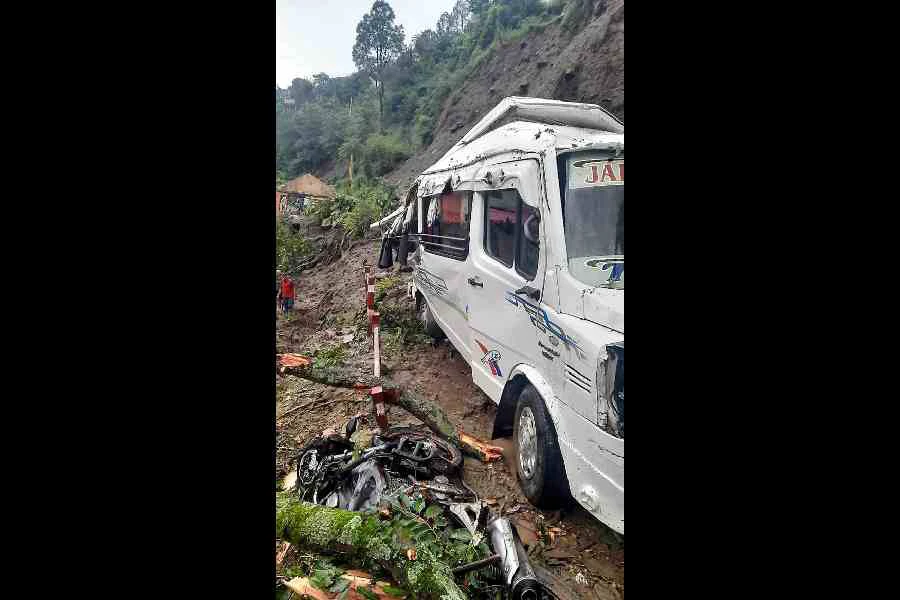Uttarakhand is witnessing a surge in newly formed landslide zones, particularly across the hill districts, severely impacting the daily lives of residents and disrupting connectivity.
A glaring example is the Chamba-Dharasu stretch of the Rishikesh-Gangotri Highway in Tehri district, where seven new landslide-prone areas have emerged along an 80km stretch. Even in the absence of rainfall, boulders and debris regularly tumble onto the road, leading to frequent traffic blockages.
This route, part of the government’s ambitious Char Dham all-weather road project, has seen increased instability since its widening. Residents of nearby villages, including Syansu, Uniyalgaon, Dhikyara, Kamand, Kuner, Dabri and Sulyadhar, often find themselves cut off from essential supplies.
Last week, villagers in Bhadwari, Raithal, Sukki and Gangnani near Nalupani along the Char Dham Highway were left without basic vegetables because of road blockages triggered by landslides. Traffic was restored on Thursday after the Border Road Organisation repaired the damage and cleared the blocked passages, but villagers fear the road may see more such disruptions.
“The villagers ate nothing except locally grown potatoes, pumpkins and rajma (kidney beans) for over a week before the damaged roads were repaired and vegetable supply was restored,” a local journalist said. “The situation is not much different along the Kedarnath and Badrinath roads.”
Residents said several mythological tales warn that the hills of Uttarakhand shouldn’t be disturbed because they are not only fragile but also restless.
“Take the example of the Srikantha Hill in Uttarkashi district, where a cloudburst on August 5 led to a flash flood that washed away the entire Dharali market and killed more than 200 locals and tourists,” Rajesh Semwal, a local (religious
guide), said.
“There’s a mythological tale about Bhagirath, an ancestor of Lord Ram, fighting a war and defeating a there before he performed on this hill to bring the Ganga to Earth. This shows that the hill was always restless, and we should be careful while planning development projects.”
were local tribes, considered nature spirits in mythical times. They were opposed to any harm to nature.
“The kings who ruled these hill areas never tried to build roads even though many of them were well-wishers of the people, because they knew that any small damage to the hills would lead to big disasters,” Rajesh said.
An army veteran said the government was falsely claiming that it had built, or was building, the roads for the benefit of pilgrims. “They were built to transport heavy weapons along the India-China border. Now we have several army camps in Chamoli district, where we had none 15 years ago,” he said.
“Earlier, we would dismantle the artillery and use mules to transport it in pieces. The mules would take days to reach the destination, and then we would reassemble the weapons, which was a difficult task.
“Since the construction of these roads, the government has transported the ready-to-use heavy artillery very easily. But it is also true that we have awakened the hills by digging them for infrastructural growth.”
The veteran said that it now takes only a few hours to reach the China border from the area, as opposed to more than a day earlier.
“There used to be landslides once in a while in the past, but now it happens every day and in every season. Our hills are not only fragile, but they also have smooth boulders. There will be landslides even if there is a slight movement in the hills,” the army veteran said.
According to government reports, landslides and flash floods have flattened 245 villages in the state over the last decade, and 2,629 families have been permanently relocated. Over ₹11 crore has been spent on shifting and resettling 255 families in 2025-26 so far.
The government is trying to contain discontent over the increasing risk to lives in the state by promptly giving a compensation of ₹5 lakh to the family of each victim.
Vinod Kumar Suman, the state disaster management and rehabilitation secretary, told reporters he had issued an order to the district magistrates to pay compensation to the victims’ nearest kin within 72 hours.
“We have created a WhatsApp group in which at least 20 people from every village, including the pradhan and the sarpanch, are added. Keeping in view the meteorological department’s orange alert for the next few days,we have alerted all of them,” he said.
Chief minister Pushkar Singh Dhami has claimed that the state has built “very strong walls” at some places and reconstructed some of the landslide-prone zones.
“The central government has sanctioned ₹125 crore for the treatment of some landslide zones. We are going to start work from the Mansa Devi Hill,” he said.
